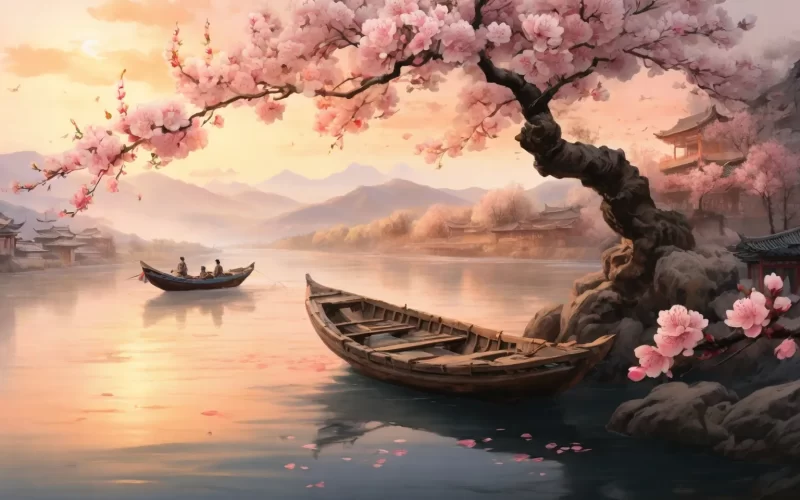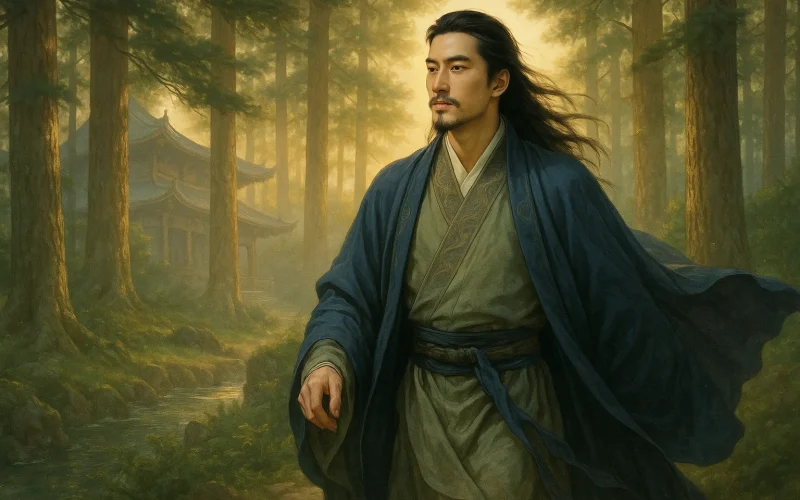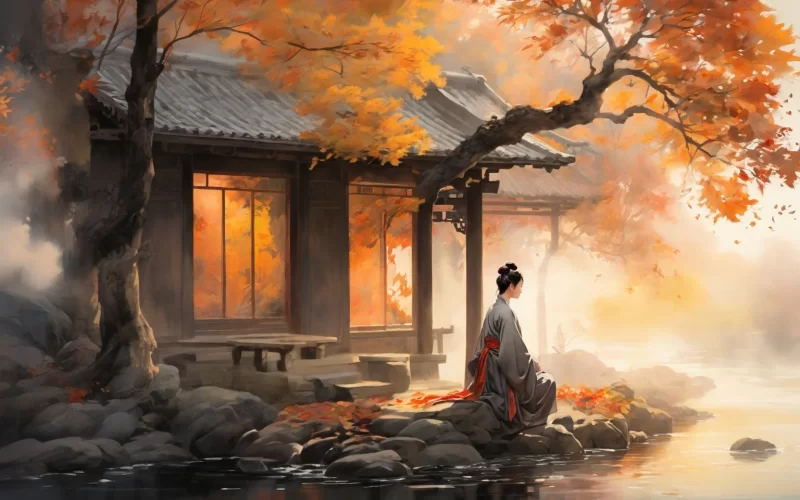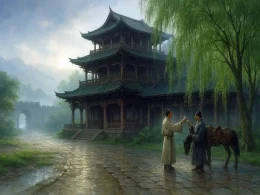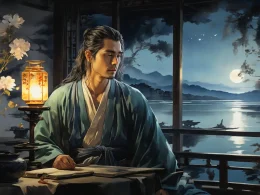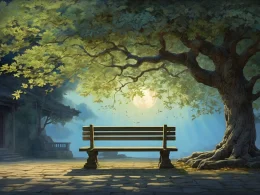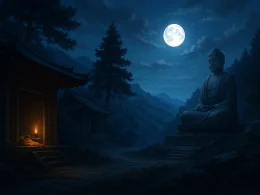A fisherman is drifting, enjoying the spring mountains,
And the peach-trees on both banks lead him to an ancient source.
Watching the fresh-coloured trees, he never thinks of distance
Till he comes to the end of the blue stream and suddenly- strange men!
It's a cave-with a mouth so narrow that he has to crawl through;
But then it opens wide again on a broad and level path --
And far beyond he faces clouds crowning a reach of trees,
And thousands of houses shadowed round with flowers and bamboos...
Woodsmen tell him their names in the ancient speech of Han;
And clothes of the Qin Dynasty are worn by all these people
Living on the uplands, above the Wuling River,
On farms and in gardens that are like a world apart,
Their dwellings at peace under pines in the clear moon,
Until sunrise fills the low sky with crowing and barking.
...At news of a stranger the people all assemble,
And each of them invites him home and asks him where he was born.
Alleys and paths are cleared for him of petals in the morning,
And fishermen and farmers bring him their loads at dusk....
They had left the world long ago, they had come here seeking refuge;
They have lived like angels ever since, blessedly far away,
No one in the cave knowing anything outside,
Outsiders viewing only empty mountains and thick clouds.
...The fisherman, unaware of his great good fortune,
Begins to think of country, of home, of worldly ties,
Finds his way out of the cave again, past mountains and past rivers,
Intending some time to return, when he has told his kin.
He studies every step he takes, fixes it well in mind,
And forgets that cliffs and peaks may vary their appearance.
...It is certain that to enter through the deepness of the mountain,
A green river leads you, into a misty wood.
But now, with spring-floods everywhere and floating peachpetals --
Which is the way to go, to find that hidden source?
Original Poem
「桃源行」
王维
渔舟逐水爱山春,两岸桃花夹古津。
坐看红树不知远,行尽青溪不见人。
山口潜行始隈隩,山开旷望旋平陆。
遥看一处攒云树,近入千家散花竹。
樵客初传汉姓名,居人未改秦衣服。
居人共住武陵源,还从物外起田园。
月明松下房栊静,日出云中鸡犬喧。
惊闻俗客争来集,竞引还家问都邑。
平明闾巷扫花开,薄暮渔樵乘水入。
初因避地去人间,及至成仙遂不还。
峡里谁知有人事,世中遥望空云山。
不疑灵境难闻见,尘心未尽思乡县。
出洞无论隔山水,辞家终拟长游衍。
自谓经过旧不迷,安知峰壑今来变。
当时只记入山深,青溪几曲到云林。
春来遍是桃花水,不辨仙源何处寻。
Interpretation
Composed in 719 AD when Wang Wei was merely nineteen, this seven-character yuefu poem creatively adapts Tao Yuanming's prose masterpiece "Peach Blossom Spring" into verse form. While paying homage to Tao's utopian vision, Wang Wei injects his own landscape aesthetic and humanistic ideals, constructing a resplendent and transcendent peach blossom realm that reflects both his yearning for an ideal world and his desire to transcend worldly turmoil.
First Couplet: "渔舟逐水爱山春,两岸桃花夹古津。"
Yú zhōu zhú shuǐ ài shān chūn, liǎng àn táo huā jiā gǔ jīn.
The fisherman's boat chases flowing waters, loving spring-clad hills;
Peach blossoms crowd both banks of the timeworn ferry.
This opening couplet depicts a vibrant spring landscape where peach blossoms frame an ancient crossing point, marking the fisherman's initial encounter with this extraordinary realm.
Second Couplet: "坐看红树不知远,行尽青溪不见人。"
Zuò kàn hóng shù bù zhī yuǎn, xíng jìn qīng xī bú jiàn rén.
Sitting, he admires crimson trees, losing sense of distance;
Sailing the blue stream's end—no human trace.
The verses transition from passive contemplation to active exploration, emphasizing the mysterious absence of human presence in this secluded paradise.
Third Couplet: "山口潜行始隈隩,山开旷望旋平陆。"
Shān kǒu qián xíng shǐ wēi yù, shān kāi kuàng wàng xuán píng lù.
At the mountain pass, stealth through winding narrows—
Then peaks part, revealing sudden plains.
This couplet captures the physical passage through constricted terrain into expansive openness, mirroring the spiritual journey from mundane to extraordinary.
Fourth Couplet: "遥看一处攒云树,近入千家散花竹。"
Yáo kàn yī chù cuán yún shù, jìn rù qiān jiā sàn huā zhú.
Afar: cloud-gathering trees cluster tight;
Near: a thousand homes 'midst flowers and bamboo.
The perspective shifts dramatically from distant mystical vision to intimate domestic scenes, showcasing the utopia's harmonious blend of natural and human elements.
Fifth Couplet: "樵客初传汉姓名,居人未改秦衣服。"
Qiáo kè chū chuán Hàn xìngmíng, jū rén wèi gǎi Qín yīfú.
Woodcutters still bear Han dynasty names;
Dwellers wear unchanged Qin attire.
These lines establish the community's remarkable cultural preservation, existing outside historical time while maintaining ancient traditions.
Sixth Couplet: "居人共住武陵源,还从物外起田园。"
Jū rén gòng zhù Wǔlíng yuán, hái cóng wù wài qǐ tiányuán.
All dwell together in Wuling's paradise,
Cultivating fields beyond worldly cares.
The couplet codifies the settlement's identity as an agricultural utopia, consciously separated from external society's concerns.
Seventh Couplet: "月明松下房栊静,日出云中鸡犬喧。"
Yuè míng sōng xià fáng lóng jìng, rì chū yún zhōng jī quǎn xuān.
Moonlit pines: silent houses stand;
Sunlit clouds: fowl and hounds clamor.
A diurnal contrast highlights the community's rhythmic harmony with nature, balancing nocturnal tranquility with daytime vitality.
Eighth Couplet: "惊闻俗客争来集,竞引还家问都邑。"
Jīng wén sú kè zhēng lái jí, jìng yǐn huán jiā wèn dūyì.
Startled by this worldly guest, all come crowding,
Vying to host him, querying of cities.
The arrival of an outsider creates dramatic tension, revealing the community's paradoxical curiosity about the world they chose to abandon.
Ninth Couplet: "平明闾巷扫花开,薄暮渔樵乘水入。"
Píng míng lǘ xiàng sǎo huā kāi, bó mù yú qiáo chéng shuǐ rù.
Dawn's light: swept lanes where blossoms fall;
Dusk's glow: fishers and woodcutters return by stream.
These verses showcase the utopia's daily rhythms, where human activities flow as naturally as the surrounding waters.
Tenth Couplet: "初因避地去人间,及至成仙遂不还。"
Chū yīn bì dì qù rénjiān, jí zhì chéng xiān suì bù huán.
First fleeing worldly strife they came here,
Then becoming transcendents, never returned.
The couplet reveals the community's origin story and spiritual transformation, contrasting with the fisherman's eventual return.
Eleventh Couplet: "峡里谁知有人事,世中遥望空云山。"
Xiá lǐ shéi zhī yǒu rénshì, shì zhōng yáo wàng kōng yún shān.
In these gorges, who knows human affairs exist?
Out in the world, they gaze at empty cloud-peaks.
A poignant irony emerges about the hidden community's existence, visible yet unknowable to the outside world.
Twelfth Couplet: "不疑灵境难闻见,尘心未尽思乡县。"
Bù yí líng jìng nán wén jiàn, chén xīn wèi jìn sī xiāng xiàn.
Never doubting this numinous realm's rarity,
Yet his dusty heart still yearned for home.
The fisherman's psychological conflict emerges between marveling at the utopia and clinging to mundane attachments.
Thirteenth Couplet: "出洞无论隔山水,辞家终拟长游衍。"
Chū dòng wúlùn gé shān shuǐ, cí jiā zhōng nǐ cháng yóu yǎn.
Leaving the cave despite mountain-water barriers,
Departing home yet planning long wanderings.
His physical departure mirrors spiritual ambivalence, torn between worlds yet committed to neither.
Fourteenth Couplet: "自谓经过旧不迷,安知峰壑今来变。"
Zì wèi jīngguò jiù bù mí, ān zhī fēng hè jīn lái biàn.
Thinking previous passage would guide his way,
How could he know peaks and gorges had changed?
The cruel irony of irreversible experience unfolds as the landscape itself denies return.
Fifteenth Couplet: "当时只记入山深,青溪几曲到云林。"
Dāngshí zhǐ jì rù shān shēn, qīng xī jǐ qū dào yún lín.
Then he only recalled penetrating deep mountains,
Following the blue stream's bends to cloud-woods.
Memory proves unreliable against the mutable landscape, with the once-guiding stream now offering no passage.
Sixteenth Couplet: "春来遍是桃花水,不辨仙源何处寻。"
Chūn lái biàn shì táo huā shuǐ, bù biàn xiān yuán hé chù xún.
Spring returns—peach-blossom waters everywhere,
Yet the immortal source? Nowhere discerned.
The devastating conclusion shows nature mocking with false signs, leaving the eternal question of utopia's whereabouts unanswered.
Holistic Appreciation
This poetic adaptation faithfully follows Tao Yuanming's original narrative while imbuing it with vivid imagery and lyrical beauty. Wang Wei's Peach Blossom Spring represents not just an ideal land but the poet's yearning for purity amidst political chaos—a spiritual refuge embodying natural harmony and peaceful simplicity.
Artistic Merits
This masterpiece achieves perfect fusion of emotion and scenery, with Wang Wei's signature technique of "painting through poetry"—using spring hues, peach blossoms, blue streams, and cloud-veiled trees to construct a dreamlike utopian vision that transports readers into its realm. The narrative flows with rhythmic precision, unfolding through the fisherman's discovery, exploration, interaction, reluctant departure, and futile return—each phase building dramatic tension through carefully paced progression.
Beyond recreating Tao Yuanming's ideal world, the poem channels Wang Wei's personal yearning to escape worldly turmoil and his profound pursuit of spiritual purity. The verses' emotional authenticity transforms this work into both an imaginative landscape and a philosophical statement—where every blossom and ripple carries dual significance as natural beauty and symbolic truth. This synthesis of aesthetic mastery and humanistic depth elevates the poem beyond mere fantasy into timeless meditation on the human condition.
Insights
Through his vision of the Peach Blossom Spring, Wang Wei expresses his longing for peace, serenity, and harmony with nature, reminding us to preserve purity and poetry amidst life's chaos. The utopia is not merely a physical realm—it is a wellspring of the soul. Though it may remain elusive, its very inaccessibility sustains hope, inspiring us to keep seeking our spiritual homeland, even in moments of disorientation.
Poem translator:
Kiang Kanghu
About the poet

Wang Wei (王维), 701 - 761 A.D., was a native of Yuncheng, Shanxi Province. Wang Wei was a poet of landscape and idylls. His poems of landscape and idylls, with far-reaching images and mysterious meanings, were widely loved by readers in later generations, but Wang Wei never really became a man of landscape and idylls.






